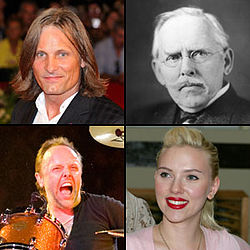Portal:Denmark
Welcome to the Denmark Portal! | ||||

|

|

| |
Denmark is the smallest and southernmost of the Nordic countries. Unified in the 10th century, it is also the oldest. Located north of its only land neighbour, Germany, south-west of Sweden, and south of Norway, it is located in northern Europe. From a cultural point of view, Denmark belongs to the family of Scandinavian countries although it is not located on the Scandinavian Peninsula. The national capital is Copenhagen.
Denmark borders both the Baltic and the North Sea. The country consists of a large peninsula, Jutland, which borders Schleswig-Holstein; many islands, most notably Zealand, Funen, Vendsyssel-Thy, Lolland, and Bornholm; and hundreds of minor islands often referred to as the Danish Archipelago. Denmark has historically controlled the approach to the Baltic Sea, and those waters are also known as the Danish straits.
Denmark has been a constitutional monarchy since 1849 and is a parliamentary democracy. It became a member of the European Economic Community (now the European Union) in 1973. The Kingdom of Denmark also encompasses two off-shore territories, Greenland and the Faroe Islands, both of which enjoy wide-ranging home rule. The Danish monarchy is the oldest existing monarchy in Europe, and the national flag is the oldest state flag in continuous use.
Selected biography

Christian IV of Denmark and Norway (April 12, 1577–February 28, 1648) was the longest reigning Danish monarch with a reign of 60 years. His reign was characterized by wars and rivalry with Sweden as well as his unsuccessful involvement in the Thirty Years' War. Christian is also remembered for founding a number of towns and a large number of buildings, including Børsen, Rundetårn and Holy Trinity Church in Kristianstad. He features in the Danish national play, Elverhøj (The Elf's Hill) and is the central figure in the Danish royal anthem Kong Christian stod ved højen mast.
Christian was the son of Frederick II and Sophia of Mecklenburg. Christian was born at Frederiksborg Palace in 1577, and succeeded to the throne on the death of his father (April 4, 1588), attaining his majority on August 17, 1596. ...
Recently selected: Nicolas Steno - Peter Schmeichel - Jacob Riis
Selected picture

Selected article
Danish chefs, inspired by continental practices, have in recent years developed an innovative series of gourmet dishes based on high-quality local produce. As a result, Copenhagen and the provinces now have a considerable number of highly acclaimed restaurants, of which several have been awarded Michelin stars.
Selected place
The museum buildings are organized into a small village of chiefly half-timbered structures originally erected between 1550 and the late 1800s in various parts of the country and later moved to Aarhus during the 1900s. There are several groceries, diners and workshops spread throughout the village with museum staff working in the roles of typical village figures i.e. merchant, blacksmith etc. adding to the illusion of a "living" village.
Categories
Denmark topics
Things you can do
- Expand stubs:
Geography stubs · People stubs · Denmark stubs in general
Help us extend these stubs and make them real articles!
- Categorize:
Help us categorize Denmark-related articles
- WikiProjects:
Have a look at WikiProject Denmark, WikiProject Faroe Islands, WikiProject Greenland and WikiProject Norse history and culture
- Noticeboard:
Have a look at the Danish Wikipedians' notice board
- Geotag:
Find coordinates for these locations and tag them: articles missing geocoordinate data
Related portals
Northern Europe
Other countries
Associated WikiMedia
The following Wikimedia Foundation sister projects provide more on this subject:
-
Commons
Free media repository -
Wikibooks
Free textbooks and manuals -
Wikidata
Free knowledge base -
Wikinews
Free-content news -
Wikiquote
Collection of quotations -
Wikisource
Free-content library -
Wikispecies
Directory of species -
Wikiversity
Free learning tools -
Wikivoyage
Free travel guide -
Wiktionary
Dictionary and thesaurus













